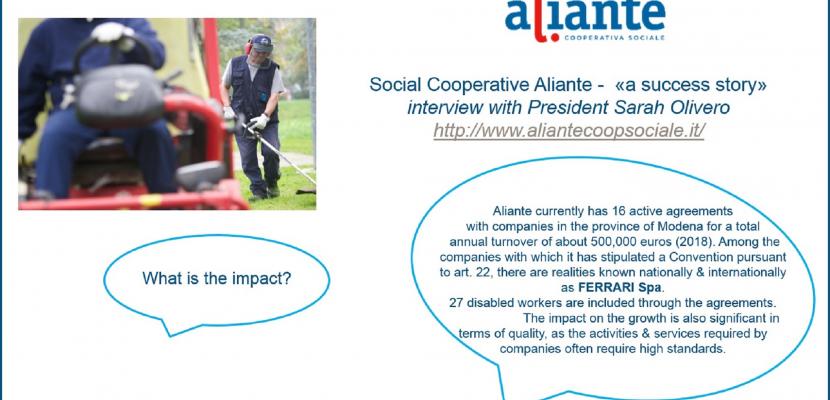Image

Regional Law for the employment of disabled people promotes social enterprises competitiveness
Published on 24 May 2018

Italy
Emilia-Romagna
This is the good practice's implementation level. It can be national, regional or local.
About this good practice
Italian National Law 68/1999 promotes the integration of disabled people into the labor market through targeted placement actions. Defined reserve shares are set for disabled people that the employer is obliged to respect otherwise he pays a fine. Many companies pay fines rather than comply with the obligations increasing the percentage of disabled not working. To tackle the problem, E-R Regional Government issued the law17/2005 "Rules for the promotion of employment, quality, safety and regularity of work". Thus, even people in particularly serious conditions can find a job in a concrete way thanks to an original conventional system that provides for their inclusion in social cooperatives. In practice, the company obliged to hire the disabled may for up to 30% not proceed with the insertion in the company if it outsources part of the activity towards a social cooperative that inserts for the precisely such workers. In this way, E-R Region tries to remedy the problem of non-compliance with the obligation to hire disabled people but also creates a link between profit companies and social cooperatives. The former instead of paying fines use the same money to outsource services to social cooperatives. The latter employ disabled people as their own mission, fulfill their recruitment obligations and benefit from an increase in activity and economic resources. Beneficiaries: disabled workers, social cooperatives, companies.
Actors: Public Administration, Associations, Trade Union
Actors: Public Administration, Associations, Trade Union
Expert opinion
This is a good practice from Italy that focuses on increasing the competitiveness of social enterprises. More specifically, by law, companies can either employ disabled people or to some extent outsource a part of their activity to social cooperatives that hire disabled people. This is expected to increase the employment of disabled people and to create a link between for-profit companies and social cooperatives. Having involved more than 400 people with disabilities in the labour market and generated a turnover of nearly 7 million euros, the evidence of success is promising. Depending on how the topic of disabled employment is addressed in various countries, the practice could have replication value in other contexts as well.
Works at
Interreg Europe Policy Learning Platform
Resources needed
The intervention does not foresee costs. Staff resources for consultation among actors and stakeholders and process monitoring.
Evidence of success
At the date of 3/31/2017, in Emilia-Romagna, there were 262 agreements engaging 30 social cooperatives and 424 workers with severe disabilities have benefited from it. The turnover generated is around 6.9 million euros.
From Social Enterprises point of view: “Creating a network between the productive system and social cooperation means creating new jobs for the most vulnerable citizens and increasing social cooperation from a qualitative point of view”
From Social Enterprises point of view: “Creating a network between the productive system and social cooperation means creating new jobs for the most vulnerable citizens and increasing social cooperation from a qualitative point of view”
Potential for learning or transfer
Law 17/2005 allows companies and social cooperatives to enter new market segments with a triple result: face social challenge of severely disabled people in finding a job; guarantee the compliance with a National Law;strengthen social enterprises’ competitiveness. European states approach the placement of people with disabilities differently: some countries have mandatory quotas (Italy, Spain, Germany, France), others (Ireland, the Netherlands, United Kingdom) do not. However, the placement of disabled people represents a common challenge for both social cohesion and competitive growth. The activity of orchestrating that takes place within the Regional Tripartite Commission between beneficiaries and stakeholders - who together with the E-R Region have agreed a Framework Convention within law 17/2005 - represents a transferable model. It can be applied in different contexts providing a wider correspondence between needs of end users and responses provided by the Public Administration
Further information
Website
Good practice owner
You can contact the good practice owner below for more detailed information.
Organisation
Emilia-Romagna region

Italy
Emilia-Romagna
Contact
EU Projects expert
